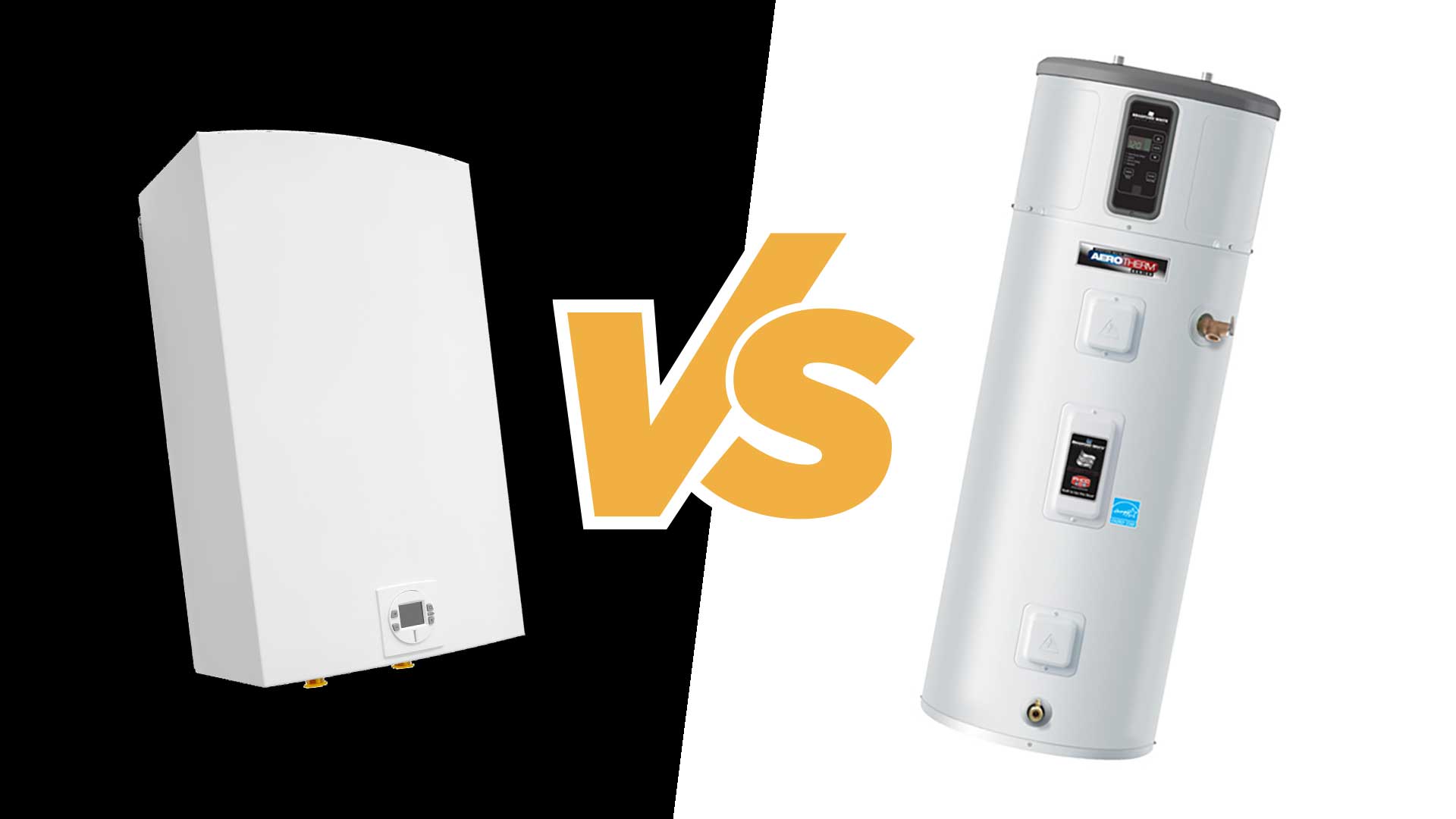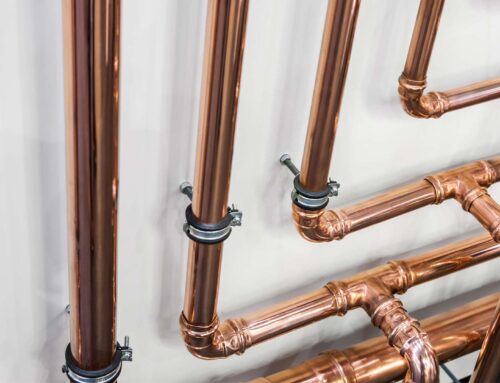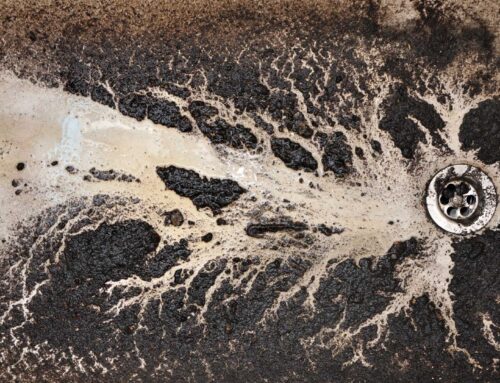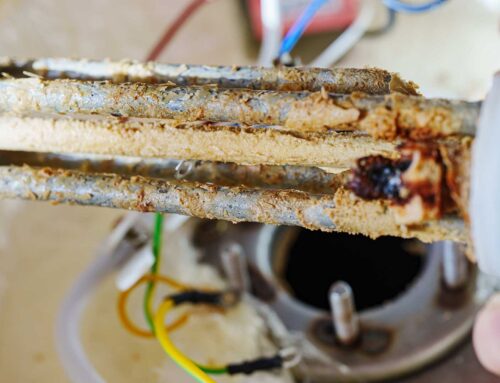Hot water is an essential part of our everyday lives. You know it. I know it. And it’s probably why you’re here.
Hot water keeps us, our home, and our things clean and hydrated. It also keeps us sane.
Just imagine the last time you were forced to take a cold shower. Or opening the dishwasher to find food still stuck to your dishes.
Investing in the right water heating system is a significant decision. When it’s time to select your home’s next water heating system, you’ll need all the facts to make the best decision for your family.
So I’m going to break down the pros and cons of electric tankless water heaters and electric heat pump water heaters. I’m not including gas-powered water heaters of any kind because the Bay Area is phasing out the sale and use of gas-powered appliances.
Five factors for comparing tankless vs. heat pump water heaters:
- Purchase and installation cost
- Operational expenses
- Environmental impact
- Energy efficiency
- Performance
Purchase and installation cost: Electric Tankless vs. Electric Heat Pump
Let’s face it, for some of us, purchase price dictates if you can even consider an option.
Electric Tankless Water Heaters
Tankless water heaters typically have a higher upfront cost compared to any other water heating system currently on the market. This is because tankless units are more technologically advanced and require specialized components such as heat exchangers and electronic controls.
Plus, the installation process may involve modifications to your home to accommodate the tankless system, such as upgrading electrical wiring.
Electric Heat Pump Water Heaters
Electric heat pump water heaters also have a higher upfront cost compared to conventional tank water heaters. But thanks to current rebate programs, we can usually install a heat pump water heater for less than a standard tank water heater.
These units use heat pump technology to extract heat from the surrounding air and transfer it to the water. This process uses far less energy than other water heaters, which means savings on your utility bills.
Installing a heat pump water heater is much like installing a standard tank water heater, so no major modifications are required.
Rebates and tax credits are available from multiple government agencies to offset the purchase and installation cost. Thanks to these government incentives the purchase price of a heat pump water heater is often less than a standard tank water heater.
Have a question about your water heater?
Call the experts at Barnett Plumbing and Water Heaters
Call Today 925-294-0171
Operational Costs: Electric Tankless vs. Electric Heat Pump
Another big factor when deciding on your water heating system is the impact it will have on your utility bill.
Electric Tankless Water Heaters
Tankless water heaters provide hot water on demand. This is no doubt its best feature. Heating water only when needed eliminates standby heat loss, or stored water cooling off as it sits waiting to be used. Heating water only once uses less energy, but it doesn’t save you much money. Electric tankless water heaters are more expensive to operate than heat pump water heaters or gas tank water heaters.
Electric Heat Pump Water Heaters
Electric heat pump water heaters offer excellent energy efficiency thanks to their heat pump technology. Instead of using electricity to create heat, it pulls heat from the surrounding air.
Heat pump water heaters are three times more energy efficient than electric tank water heaters, according to the Department of Energy. This increased efficiency translates into substantial long-term cost savings on utility bills.
Environmental Impact: Electric Tankless vs. Electric Heat Pump
Electric Tankless Water Heaters
Compared to standard tank water heaters, tankless options are better for the environment. Since tankless options eliminate standby heat loss, they use less energy and have less environmental impact.
Electric Heat Pump Water Heaters
Heat pump water heaters use less energy than any other system on the market. Since they pull heat from the surrounding air instead of generating heat from a power source, they reduce energy consumption and greenhouse gas emissions.
The Tri-Valley area, like most of California, is committed to reducing our carbon footprint, our reliance on natural gas, and increasing sustainable systems. Heat pump water heaters are a perfect match for these goals.
Efficiency: Electric Tankless vs. Electric Heat Pump
Are Electric Tankless Water Heaters Efficient?
Regarding energy efficiency, tankless water heaters are designed to minimize standby heat loss, which occurs when water sits unused in a storage tank. By heating water only when needed, tankless units can be highly efficient.
Are Electric Heat Pump Water Heaters Efficient?
Heat pump water heaters use advanced heat pump technology to efficiently heat water. Using heat in the surrounding air reduces the energy needed to have hot water.
We install units that are 3.3 & 3.5 UEF rated. Far above the standard 2.2 Energy Star requirements.
Heat pump water heaters are the most energy-efficient water heating systems currently on the market.
Performance: Electric Tankless vs. Electric Heat Pump
Electric Tankless Water Heaters
Tankless water heaters provide hot water on demand, eliminating the need for a storage tank. This means you’ll never run out of hot water, as long as you purchase the right size for your family’s needs.
Since tankless water heaters are designed for hot water on demand, electric-powered tankless systems have shorter recovery times than any tank system.
Electric Heat pump Water Heaters
Heat pump water heaters have a slower recovery time compared to tankless units or traditional storage tanks.
To maximize the efficiency and performance of an electric heat pump water heater, ensure that the unit is sized appropriately for your household’s hot water needs.
Best water heating system for Tri-Valley homes? Electric Heat Pump water heaters.
After reviewing the key factors, it’s evident that electric heat pump water heaters offer several advantages over tankless water heaters for Tri-Valley residents.
Electric heat pump water heaters are the better option.
- Lower purchase and installation cost.
- Increased savings on utility bills.
- Less carbon footprint and lower energy consumption.
- More efficient.
- Slower recovery time than tankless, BUT selecting the right capacity for your family will ensure optimal performance.
Schedule Your Free On-Site Estimate Today!
Get Started!You may not be ready for a new water heater, but it’s worth a phone call to learn more about your options and the savings offered by current rebates. Call us at (925) 315-8051 and we’ll be glad to answer your questions.
When you call or schedule an on-site estimate, there will be no pressure. No obligation. We will not sell you a water heater or upgrade you don’t need or want.
Thanks for letting us be your trusted plumber.

Phil Barnett
President of Barnett Plumbing & Water Heaters






